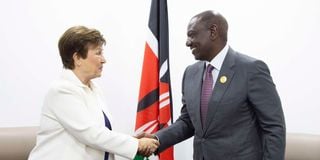Kenya Kwanza’s confounding economic laundry list

President William Ruto meets with IMF Managing Director Kristalina Georgieva on the sidelines of COP27 in Sharma El-Sheikh, Egypt.
What do you think of the following laundry list of economic policies?
Resolve the high risk of debt distress by reducing short-term domestic debt. Raise interest rates. Borrow more domestically. Increase the budget by Sh269 billion. Undertake serious fiscal consolidation. Tax hustlers more. Support production through subsidised fertiliser. Increase cost of fuel. Increase the cost of electricity. Make it cheaper to import goods. Build county industrial parks.
Extend the SGR. Fight corruption. Fighting corruption is not a priority. Create hustler fund. Increase turnover tax on businesses by hustlers to three per cent and reduce the threshold at which they have to pay to Sh1,470 of sales per day. Encourage youth to participate in the digital economy. Introduce 15 per cent withholding tax on digital content creators. Tax sales of digital assets.
If you are thinking confused, contradictory, inconsistent and incoherent, you are not alone. Sadly, these are the policies pronounced as well as presented by the current regime in the budget policy statement, the debt management strategy and the Finance Bill, 2023.
In a mid-week TV interview on the state of the economy, my colleagues wondered why key economic managers such as the Central Bank governor and the Treasury CS are deafening in their silence. The CS admitted to a parliamentary committee a few weeks ago that he was facing a perfect storm. After that, not a word on how he was going to fix it.
I don’t have an explanation for their silence, and in any case, I don’t hold brief for them. But I can guess they are tongue-tied because it is rather difficult to explain away the policy incoherence that characterises this regime.
Let us then examine the laundry list briefly. The current regime criticised their Jubilee colleagues for not living within the country’s means and over borrowing. They promised to reduce this year’s budget by Sh300 billion. Using IMF and Treasury English, living within our means is called fiscal consolidation. Yet the regime has proceeded to increase the budget by Sh269 billion in their proposed first full-year budget.
The Treasury and their IMF colleagues have pointed out that Kenya has for three years been at high risk of debt distress. Treasury has explained that this is because a large stock of short-term debt (about Sh800 billion shillings) is maturing this year.
Domestic borrowing
Strangely, the regime proposes to borrow Sh522 billion from the domestic market, 19 per cent more than in the current financial year. And this will further increase by 17 per cent the following year! In addition, the CBK rate has been adjusted upwards three times since the current regime took office.
Domestic financial markets and international rating agencies have naturally responded with consternation and disapproval. Since January, all bond issues except one, have been under-subscribed. And Moody’s, the rating agency, has downgraded Kenya’s rating.
Experts in the regime loudly criticised their Jubilee colleagues for ‘pre-occupation’ with large-scale, expensive infrastructure. But they have recently announced plans to extend the SGR! For Sh2.1 trillion only.
They have also decided to increase the turnover tax to three per cent of sales and lowered the cut-off point at which you start paying to Sh1,370 of sales per day.
To further complicate matters, they propose to increase VAT on fuel, and have increased electricity tariffs. The regime further proposes to reduce the cost of importing goods, by lowering the import declaration fees and railway development levy. While this might support import trade, it will make imported goods more competitive compared to Kenya made ones.
ICT has been a key source of growth the last two decades. Kenya has maintained a lead in software and apps, with Kenyan ICT startups attracting private equity and venture capital. The regime now proposes to introduce a 15 per cent withholding tax on digital content creators. All other professional services pay withholding tax at five per cent.
The regime also proposes to tax the sale of digital assets, like non-fungible tokens, at market value, which means you still pay tax even when you make a loss on the sale! The regime plans to continue on this trajectory of budget increases, more taxes, and higher domestic borrowing until a budget of 5.1 trillion shillings by 2026/7. By then you will be expected to cough up Sh3.8 trillion in taxes.
Does this laundry list of economic policies inspire you?
@NdirituMuriithi is an economist.





